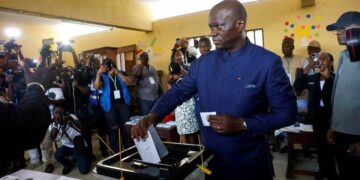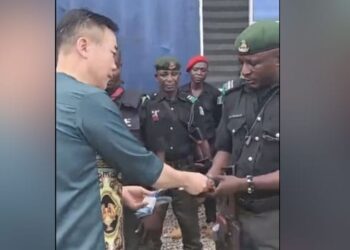By Olusegun Adeniyi
It’s strange but I actually fell in love with Burna Boy before I even knew his name or what he does for a living. Stranger still is that I was attracted by his promotion of alcohol, which I don’t take. Okay, some of my friends would argue that Star Lager beer doesn’t fall into the category of alcohol because it’s a ‘beverage’. I won’t argue with that. Whenever the ‘shine shine, come to the brighter side’ advertisement featured in the course of the European Champions League football match television broadcast, I would smile and say to myself: I love this young man. Until I could match the face with the name and began paying attention to his international media, I actually thought he was from Nollywood!
I still cannot claim to be very familiar with his music (those who know me are quite aware I am of the Old School, more at home with Odolaye Aremu, Haruna Ishola, Christy Essien-Igbokwe, Salawatu Abeni, Sunny Okosun, Bongos Ikwue et al), but I make sure I read anything written about Burna Boy, as well as his interviews. I even follow his controversial duels in the toxic Nigerian social media landscape. I am aware that the song track, ‘Destiny’ from his 2019 album ‘African Giant’ was included in the playlist at the inauguration of the United States President Joe Biden in January. Last October, TIME Magazine named him among the 2020 ‘Next Generation Leaders’. Four months earlier in June 2020, he featured in ‘One World: Together at Home’—a benefit concert curated by Lady Gaga and put together by several artistes to support the World Health Organisation (WHO) in the fight against COVID-19 pandemic.
Hailed by the Los Angeles Times as “savvy and modern but undistracted by obvious crossover moves”, the Grammy nomination sums up Burna Boy’s music as “seamlessly blending styles and genres and fearlessly fuelling the fire heating the melting pot of pop, Afrobeat, dancehall, reggae and more,” while his ‘Twice as Tall’ was extolled as “a masterclass in the vibe and hustle that have made Burna Boy an international musical force”. It therefore came as no surprise when last Sunday in the United States, he won his first Grammy in the ‘Best Global Music Album’ category.
I join millions of our people to congratulate the ‘African Giant’! It is even more heart-warming that he was not the only Nigerian who shined at the 63rd Grammy Awards. Wizkid also did. His duet song, ‘Brown Skin Girl’, with Beyonce won the ‘Best Music Video Award’. Beyond the fact that I have on different occasions found myself ‘Pakurumo-ing’ while driving when the melodious track is played on radio, I can also not claim to be into Wizkid’s music. But as a student of the Nigerian entertainment industry, I know quite a bit about ‘Star Boy’ and others by following their stories in the media. For a young man who chose his career path from age 11 with the ‘Glorious Five’, a group he co-founded with church friends, Wizkid has really done well. Not only is he one of the biggest names in African Music, he also boasts of no fewer than 4.7 monthly listeners on Spotify, with many local and international awards to his credit.
That the Nigerian music scene is replete with emerging global superstars is no longer in doubt. For instance, Davido is featured as a singing actor (appearing as himself) in the recently released American comedy, ‘Coming 2 America’, a sequel to the 1988 ‘Coming to America’ starring Eddie Murphy. The ‘Koroba’ song by Tiwa Savage is also featured in the same movie. And then you have Yemi Alade and other artistes who bestride the African continent, using their talent and creativity to project a more positive image of Nigeria.
In a recent piece, I wrote of the contradictions of a nation where military officers were heads of state, governors and federal ministers in their thirties and professionals were appointed federal permanent secretaries in their twenties. Yet people in those age brackets are now practically excluded from crucial decision making in all spheres of our national life. The achievements of both Burna Boy and Wizkid are therefore worthy of celebration because they are by dint of their personal efforts. At 29 and 30 respectively, either of the duo can claim to be a face of the new generation of Nigerian youth who excel despite all odds. Not failed ‘Ta ta ta’ governors who gallivant all over the place, claiming to be seeking the presidency as a Nigerian ‘youth’!
Meanwhile, there is a needless debate on social media about who is the first Nigerian to win a Grammy. Some give the record to the late Michael Babatunde Olatunji. The reputable drummer, who died in 2003, was part of the group whose album, ‘Planet Drum’, won the Grammy Award for ‘Best World Music Album’ in 1991—the year the award was first given. It is also on record that Olatunji left Nigeria in 1950 and was already at the time an established American, renowned for his literary works, including teaching. That of course does not diminish his Nigerianess but Burna Boy and Wizkid were ‘made in Nigeria’ before exporting their craft to the international stage.
We savour their achievement and that of other compatriots in different fields of human endeavour, including literature, science and technology. But we must interrogate why it is easier for our people to more easily excel as global citizens than within their local environment. In fact, given the rate at which people of Nigerian descent are recognised and elected/appointed into important positions abroad, we need to look not only at the reward system for creativity in our country but also the recruitment criteria for leadership. These are some of the things holding our country back from peace and prosperity. Bottom-line: We must begin to enthrone meritocracy by looking for qualities that transcend ethnicity, religion etc. so that the best of us can lead the rest of us, in the interest of all.
Kidnappings Incorporated!
Although I have heard tales from victims of kidnappings who were released after ransom was paid, this was gripping. Nuhu Tanko is a gardener at the Shehu Musa Yar’Adua Centre whose two brothers were kidnapped on 31st December 2020 on the way from their village (Dakunu in Chukum local government of Kaduna) to the state capital. According to their account, the kidnappers, clad in military camouflage, were more than 50 in number, all on motor bikes, with each carrying at least two guns. They were all masked. The two brothers were also on a motor bike which was burnt by their abductors after they were kidnapped.
At the Katarimape forest where they were taken, the duo met three other victims who, like them, had their hands and feet tied. Each day, the five captives were given a cup of water each and some local biscuits to share. When the kidnappers eventually reached the Tanko family, they demanded a ransom of N10 million. After selling their small piece of land and everything else the family could sell, negotiations spanned three weeks. They reached out to Tunde Ahmadu, the Yar’Adua Centre Chief Operating Officer to help raise money. Tunde was allowed to listen in on one of the calls with kidnappers who threatened to kill the two boys if the ransom money was not produced on time.
After gathering N900,000 in cash for the two (and having been warned never to involve the police if they wanted them back alive), a Tanko family ‘emissary’ took the money to a specified location in Katarimape forest as directed by the kidnappers. A few hours later, the two brothers returned home. In lamentation, Tanko said while giving me the narrative of how the tragic saga evolved, “Most people have left our village because of kidnappings. It’s like bandits have taken over our village and the surrounding communities. They kidnap people, kill and rape women, even if the women are pregnant.”
The pathetic picture painted by Tanko is not different from the account of Mallam Iliya Gwaram, father of one of the abducted Jangebe school girls in Zamfara State, who himself was in captivity at the time the female students were brought to join them. “l saw the school girls being brought into where we were camped by our abductors. At first, l didn’t know who they were or where they were coming from, until l saw the face of my scared daughter looking at me. I quickly told some of the girls who were brought along with her and sat near me to tell my child not to show any indication that she even knew me” Gwaram recounted after his release a few days later. “The girls were brave enough and they kept our little secret up to the last day of their four days stay with us. l never cried in the whole of my life like l cried the day the girls were taken back because l felt it was the last time l would see my daughter.”
Asked whether the state government paid any ransom before securing his release, Gwaram gave a rather clever answer: “Look at those two women that were rescued along with me; two million naira was said to have been raised by their relatives to give to the bandits more than two months ago. But the money could not be traced as it was suspected that it was a different gang that intercepted the man bringing the money and took it from him.”
Yesterday, I obtained from Senator Saidu Dansadau, the chilling report of the Zamfara State committee established to find solutions to banditry and the spate of kidnappings. Dansadau and other stakeholders in the state, including the former Inspector General of Police, M.B. Abubakar who chaired the committee, made a number of critical observations. One, the pauperisation of local government through the hijack of their funds by governors has in turn led many frustrated young people to use drugs as their only means of escape. Two, deployment of these young people as political thugs during electioneering campaigns and their abandonment after elections has left them no other vocation except banditry. Three, the ease with which suspects of heinous crimes get released from police custody indicates collusion with powerful people in the state. The committee claimed in its report that at the instance of a former governor, (name withheld), a High Court Judge in the state (name withheld) granted bail to three criminal gang leaders who were arrested at Sultan Abubakar International Airport, Sokoto. “Three days after their release, they attacked the village of the person who volunteered information to the governor and killed six people,” the report stated.
Detailing how criminals have practically taken over the state, with some of their enablers in the military and police, as well as the colossal human and material losses suffered by Zamfara people in the process, the committee recommended the dismissal of some policemen, including one who is already retired, “for substituting the name of a murder suspect with the name of an innocent person” who was then detained and framed for the murder. They also recommended that ten military officers be court marshalled “for dirty involvement in escalating the menace of armed banditry, mismanagement of recovered livestock and unholy relationship with criminals.”
If there is anything the Zamfara report reveals, it is the level of collusion between criminals and unscrupulous security and military personnel. That may then explain the ease with which kidnappers now enter schools to ferry away innocent children. The greater challenge is that the population of those we now ‘cannonise’ as bandits (for whom some people seek ‘amnesty’ and ‘reparation’) are growing every day. But the Zamfara report makes several observations and recommendations on how to tackle the menace. I am sure there are similar reports from other states, especially in the North.
At the end, everything still boils down to leadership. There will be no solution to this national crisis until our public officials in these states and Abuja adopt the position of Governor Nasir El-Rufai of Kaduna State that their duty is to “enforce the law, not negotiate with bandits.”
• You can follow me on my Twitter handle, @Olusegunverdict and on www.olusegunadeniyi.com

































